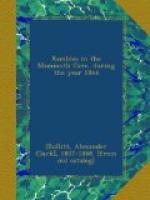that pours from the roof. Other avenues could
most likely be found by sounding the sides of the pit,
if any one had the courage to attempt the descent.
We are far enough from
terra supra, and our
dinner which we had left at the “Vineyard.”
We hastened back to the Rocky Mountains, and took
the branch which we left at our right on emerging
from the Cabinet. Pursuing the uneven path for
some distance, we reached “Serena’s Arbor,”
which was discovered but three months since, by our
guide “Mat.” The descent to the Arbor
seemed so perilous, from the position of the loose
rocks around, that several of the party would not
venture. Those of us who scrambled down regarded
this as the crowning object of interest. The
“Arbor” is not more than twelve feet in
diameter, and of about the same height, of a circular
form; but is, of itself, floor, sides, roof, and ornaments,
one perfect, seamless stalactite, of a beautiful hue,
and exquisite workmanship. Folds or blades of
stalactitic matter hang like drapery around the sides,
reaching half way to the floor; and opposite the door,
a canopy of stone projects, elegantly ornamented,
as if it were the resting-place of a fairy bride.
Every thing seemed fresh and new; indeed, the invisible
architect has not quite finished this master-piece;
for you can see the pure water, trickling down its
tiny channels and perfecting the delicate points of
some of the stalactites. Victoria, with all her
splendor, has not in Windsor Castle, so beautiful
an apartment as “Serena’s Arbor.”
Such is the description of Cleveland’s Avenue,
as given by this clerical gentleman. It is perfectly
graphic, and corresponds with all the glowing accounts
I have read of this famous place. Exquisitely
beautiful and rare as are the formations in this avenue,
it will soon be, I fear, like the Grotto of Pensico—shorn
of its beauties. Many a little Miss, to decorate
her centre table or boudoir, and many a thoughtless
dandy to present a specimen to his lady fair, have
broken from the walls (regardless of the published
rules prohibiting it,) those lovely productions of
the Almighty, which required ages to perfect; thus
destroying in a moment the work of centuries.
These beautiful and gorgeous formations were encrusted
on the walls by the hands of our Maker, and who so
impious as to desecrate them—to tear them
from their place? there they are, all lovely and beautiful,
and there they ought to remain, untouched by
the hands of man, for the admiration and wonder of
all future ages. If the comparatively small cave
of Adelburg which belongs to the Emperor of Austria,
be placed for the preservation of its formations under
the protecting care of the government [Transcriber’s
note: sic] (as is the case,) what ought not to
be done to preserve the mineralogical treasures, in
this great Cave of America, and especially in Cleveland’s
Cabinet, which are worth more than all the caves in
Europe, indeed of the world, so far as our knowledge
of caverns extends.




